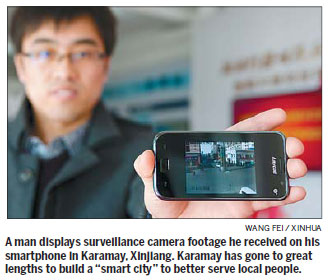
The remote oil town of Karamay in Northwest China's Xinjiang Uygur autonomous region is adopting cutting-edge technology to become a "smart city" in order to make life easier for residents and improve local administration, its mayor said.
"Information technology is not just about technology. It should be integrated with all aspects of life in our city and make people's lives more convenient," Karamay Mayor Chen Xinfa said on the sidelines of the 18th National Congress of the Communist Party of China.
"The 'smart city' could also alert city leaders like me to what needs to be done urgently regarding city management or emergencies," said Chen, who is also a delegate to the congress.
"For Karamay, it's not the future, but what's happening now. "
In August, Karamay launched a joint program with IBM to become a "smart city". The concept, proposed by IBM, is based on technologies such as the Internet of things and cloud computing, and embraces transportation, healthcare and public security.
For example, Chen said that almost every bus station in Karamay is equipped with an electronic screen displaying information about the arrival of the next bus. Residents can even check the exact time a bus will arrive on their mobile devices.
And if an elderly person pushes the panic button in their home, the "smart city" system automatically informs emergency units, including first aid and the fire department, as well as their relatives, he said.
In addition, if a growing number of people are registered as unemployed in the city, the local social security system will alert officials, he added.
"Such smart systems can free officials from drafting documents and attending meetings, and enable them to work more efficiently and creatively," said Chen, who holds a doctoral degree in geology and is also vice-chairman of the Xinjiang Association for Science and Technology.
Karamay, with a population of about 400,000, is an important oil industry hub in the Junggar Basin of northern Xinjiang.
Chen said people are often surprised when they hear about Karamay's plan to become a "smart city", because they don't understand how a program with such cutting-edge technology could work in such a remote city.
However, Karamay has become the first wireless communications city in northwestern China, paving the way for it to become a "smart city", according to China Mobile, the nation's biggest mobile operator by user base. China Mobile has been promoting its Wireless City project since 2008.
The project, which aims to provide information and services on mobile terminals, means that Karamay is covered by a web of 2G, 3G and Wi-Fi networks.
Karamay's mobile phone penetration rate is around 170 percent, much higher than the national average of 70 percent, according to the city's branch of China Mobile.
Contact the writers at zhuzhe@chinadaily.com.cn and cuijia@chinadaily.com.cn.
(China Daily 11/14/2012 page5)
